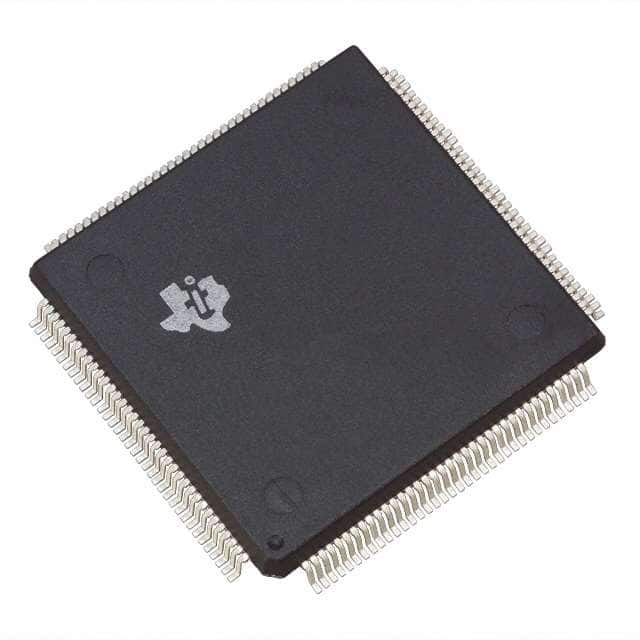Viz Specifikace pro podrobnosti o produktu.

TMS320C32PCMA50
Overview
Product Category
TMS320C32PCMA50 belongs to the category of digital signal processors (DSPs).
Use
This product is primarily used for processing and manipulating digital signals in various applications such as telecommunications, audio and video processing, image recognition, and control systems.
Characteristics
- High-performance DSP with advanced signal processing capabilities
- Efficient execution of complex algorithms
- Low power consumption
- Integrated peripherals for seamless system integration
- Flexible architecture for customization and optimization
Package
TMS320C32PCMA50 is available in a ceramic package, which provides enhanced durability and thermal performance.
Essence
The essence of TMS320C32PCMA50 lies in its ability to perform high-speed digital signal processing tasks with exceptional accuracy and efficiency.
Packaging/Quantity
This product is typically packaged individually and is available in various quantities depending on the customer's requirements.
Specifications
- Architecture: 32-bit fixed-point
- Clock Speed: 50 MHz
- Instruction Set: Highly optimized for signal processing tasks
- Memory: On-chip RAM and ROM
- I/O Interfaces: Serial ports, parallel ports, timers, and interrupt controllers
- Power Supply: 3.3V
Detailed Pin Configuration
- VDD - Power supply voltage
- GND - Ground
- RESET - Reset pin for initializing the processor
- CLKIN - External clock input
- CLKOUT - Clock output for synchronization purposes
- A0-A15 - Address bus
- D0-D15 - Data bus
- RD - Read control signal
- WR - Write control signal
- INT - Interrupt request signal
- CS - Chip select signal
- WAIT - Wait state control signal
- DMA - Direct memory access control signal
- I/O - General-purpose input/output pins
Functional Features
- High-speed arithmetic and logic operations
- Efficient multiply-accumulate (MAC) instructions
- Advanced interrupt handling mechanism
- On-chip peripherals for seamless system integration
- Flexible memory management unit (MMU)
- Support for various communication protocols
Advantages and Disadvantages
Advantages
- Exceptional performance in signal processing applications
- Low power consumption for energy-efficient designs
- Integrated peripherals reduce external component count
- Flexible architecture allows customization and optimization
- Wide range of available development tools and support
Disadvantages
- Limited availability of alternative models with similar specifications
- Steep learning curve for beginners due to complex architecture
- Higher cost compared to general-purpose microcontrollers
Working Principles
TMS320C32PCMA50 operates on the principle of executing instructions stored in its internal memory to perform digital signal processing tasks. It utilizes a combination of arithmetic and logic operations, along with specialized instructions optimized for signal processing algorithms. The processor communicates with external devices through various I/O interfaces and can handle interrupts efficiently.
Detailed Application Field Plans
TMS320C32PCMA50 finds extensive application in the following fields:
- Telecommunications: Signal processing in wireless communication systems, voice and data transmission.
- Audio and Video Processing: Real-time audio and video compression, decompression, and enhancement.
- Image Recognition: Processing and analysis of images for object detection, pattern recognition, and computer vision applications.
- Control Systems: Implementation of control algorithms in industrial automation, robotics, and automotive systems.
Detailed and Complete Alternative Models
While TMS320C32PCMA50 is a highly capable DSP, there are alternative models available in the market that offer similar functionality. Some notable alternatives include:
- TMS320C31PCMA50: Similar architecture and features but operates at a lower clock speed.
- TMS320C50PCMA50: Offers enhanced performance and additional features but at a higher cost.
- ADSP-21489: A competing DSP from Analog Devices with comparable specifications.
In conclusion, TMS320C32PCMA50 is a powerful digital signal processor designed for high-performance signal processing applications. Its advanced features, flexible architecture, and wide range of applications make it a popular choice among engineers and developers in various industries.
Word Count: 550
Seznam 10 běžných otázek a odpovědí souvisejících s aplikací TMS320C32PCMA50 v technických řešeních
Sure! Here are 10 common questions and answers related to the application of TMS320C32PCMA50 in technical solutions:
Q: What is TMS320C32PCMA50?
A: TMS320C32PCMA50 is a digital signal processor (DSP) chip manufactured by Texas Instruments.Q: What are the key features of TMS320C32PCMA50?
A: Some key features include a 32-bit fixed-point DSP core, on-chip memory, multiple I/O interfaces, and high-speed processing capabilities.Q: What are the typical applications of TMS320C32PCMA50?
A: TMS320C32PCMA50 is commonly used in audio and speech processing, telecommunications, industrial control systems, and medical devices.Q: How does TMS320C32PCMA50 handle real-time processing?
A: TMS320C32PCMA50 is designed for real-time processing with its high clock speed and efficient instruction set architecture.Q: Can TMS320C32PCMA50 be programmed using C/C++?
A: Yes, TMS320C32PCMA50 supports programming in C/C++ using development tools provided by Texas Instruments.Q: Does TMS320C32PCMA50 have built-in peripherals?
A: Yes, TMS320C32PCMA50 has various built-in peripherals such as UART, SPI, I2C, timers, and GPIOs for interfacing with external devices.Q: What is the power consumption of TMS320C32PCMA50?
A: The power consumption of TMS320C32PCMA50 depends on the operating frequency and the specific application, but it is generally low compared to other DSPs.Q: Can TMS320C32PCMA50 be used in battery-powered devices?
A: Yes, TMS320C32PCMA50's low power consumption makes it suitable for battery-powered devices where power efficiency is crucial.Q: Are there any development boards available for TMS320C32PCMA50?
A: Yes, Texas Instruments provides development boards and evaluation kits specifically designed for TMS320C32PCMA50 to aid in the development process.Q: Is TMS320C32PCMA50 still widely used in modern applications?
A: While newer DSPs have been introduced, TMS320C32PCMA50 is still used in various legacy systems and applications due to its reliability and compatibility.
Please note that these questions and answers are general and may vary depending on specific requirements and use cases.

